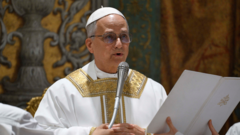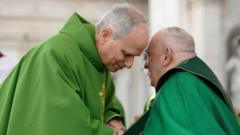As cardinals prepare to elect Pope Francis' successor, they confront deep ideological divisions regarding the future direction of the Catholic Church, balancing tradition and open discussion against polarization.
Cardinals Face Ideological Divide in Selecting Pope Francis' Successor

Cardinals Face Ideological Divide in Selecting Pope Francis' Successor
With debates over the church's direction intensifying, cardinals gather in Rome for a pivotal conclave to elect the next pope.
Cardinals traveling to Rome for next week's conclave to choose a successor to Pope Francis are facing intense ideological divides that mirror the wider world’s political polarization. Initially, the cardinals seem to be divided along the familiar left-right spectrum, with many conservative members having contentious relationships with Pope Francis, known for his liberal inclinations, especially in advocating for marginalized groups. However, the perceived binary between progressives and conservatives does not neatly align with the complexities within the church.
The primary issue, rather than any single policy, is the philosophical question of who deserves a role in shaping the Catholic Church's future. The cardinals' choice hinges on whether they will extend the legacy of Pope Francis, who championed inclusivity and engagement. According to Anna Rowlands, a political theologian at Durham University, Francis sought to navigate a highly polarized society by inviting dialogue even amidst disagreement.
The continuation of dialogue versus a potential retreat to strictly ideological positions could mark this pivotal moment in the church’s history. As the conclave approaches, observers note the pressing need for the cardinals to deliberate not only on specific issues but also on the fundamental values guiding their decisions, influencing the church’s trajectory in the years to come.





















